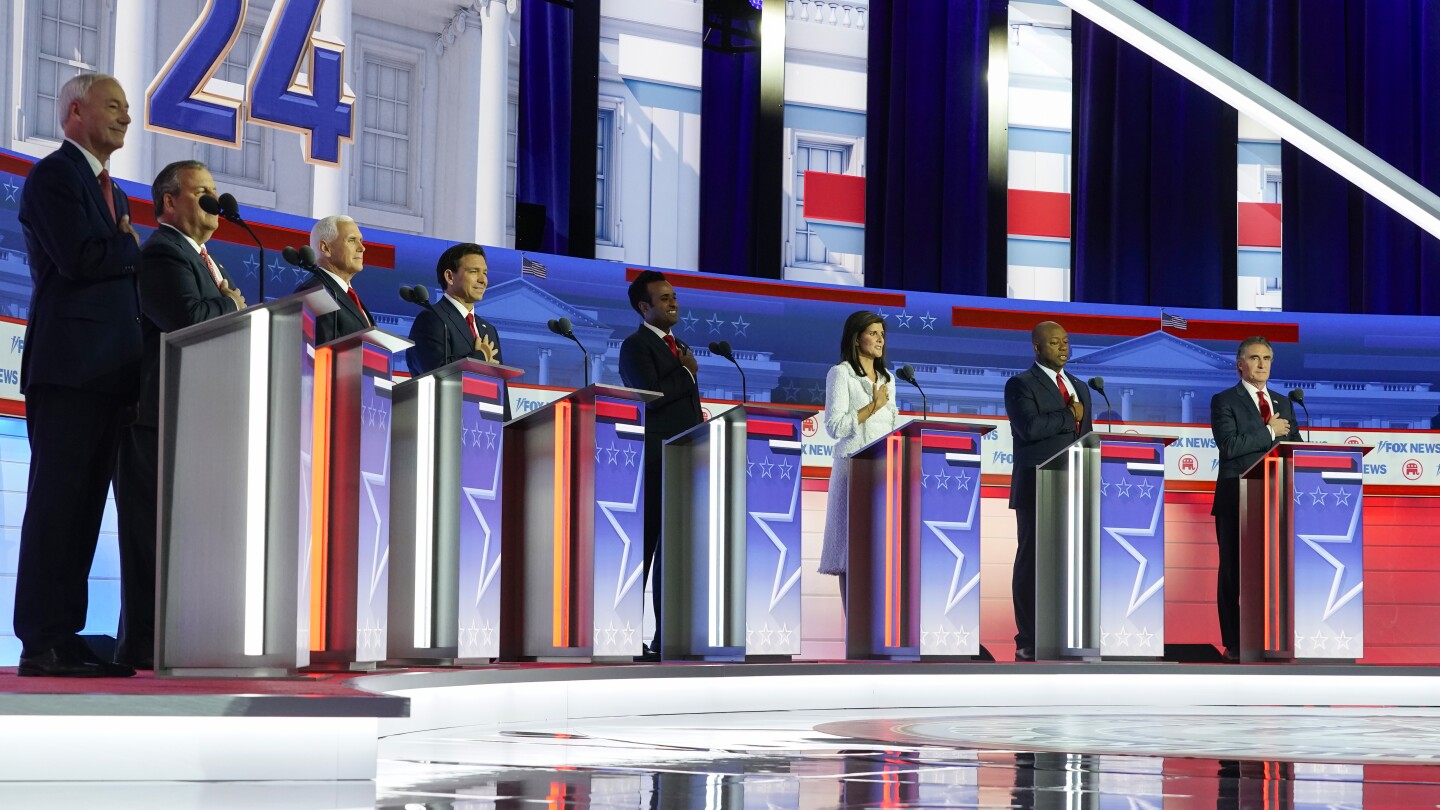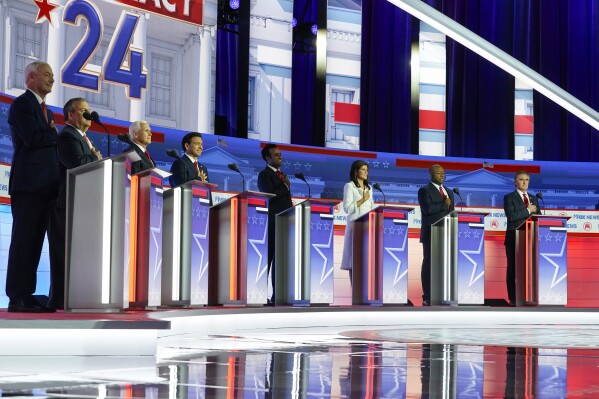MILWAUKEE (AP) — Republican presidential candidates vying to be the leading alternative to front-runner Donald Trump opened the first Republican primary debate Wednesday night with broadsides criticizing President Joe Biden’s handling of the economy and what they consider to be excessive government spending.
“Our country is in decline,” Florida Gov. Ron DeSantis said to applause.
The former president wasn’t on stage in Milwaukee, choosing to skip the primetime event. But he was a central figure nonetheless, with Fox News moderators Bret Baier and Martha MacCallum expected to press his rivals to articulate how they would differ in style and substance from Trump, who holds a commanding early lead in the race.
With less than five months until the Iowa caucuses jumpstart the GOP presidential nomination process, the debate is a critical opportunity for lower-polling candidates to introduce themselves to millions of voters, many of whom are just beginning to pay attention to the race. The pressure is greatest for DeSantis who announced his campaign in May to great fanfare but has since struggled to gain traction and is now fighting to maintain his distant second-place status.
Also on stage were South Carolina Sen. Tim Scott, former U.N. Ambassador Nikki Haley, biotech entrepreneur Vivek Ramaswamy, former New Jersey Gov. Chris Christie, former Vice President Mike Pence, former Arkansas Gov. Asa Hutchinson and North Dakota Gov. Doug Burgum, who was hospitalized after hurting his Achilles tendon but chose to participate nonetheless.
The primetime event was unfolding at a moment of reckoning for the Republican Party.
Trump is the prohibitive early front-runner in the race, raising serious questions about whether the party will have much of a competitive primary. Yet Trump’s vulnerabilities in a general election are clear, particularly after four criminal indictments that charge him with hoarding classified documents, conspiring to overturn the 2020 election and making hush money payments to a porn actor and other women.
On Thursday, Trump is set to travel to Georgia to be booked again on criminal charges.
Yet Trump’s standing in the primary has only increased as the charges have mounted, leaving the GOP on track — barring a stunning realignment — to nominate a candidate who would enter the race against Biden, a Democrat, in a potentially weak position. Polling this month from The Associated Press-NORC Center for Public Affairs Research found 64% of Americans are unlikely to support Trump if he is the GOP nominee, including 53% who say they would definitely not support him and 11% who say they would probably not support him in November 2024.
The debate was being held at the Fiserv Forum in downtown Milwaukee, the arena that is home to the Milwaukee Bucks basketball team. The city will also be the site of next summer’s Republican convention, a sign of the state’s premier battleground status.
The Republican National Committee had set polling and donor thresholds and required participants to sign a loyalty pledge in order to qualify.
Trump had long said he felt it would be foolish to participate, given his dominant lead in the race.
His decision to boycott was nonetheless a blow to the network, which had wooed him privately and publicly to appear. Instead, Trump pre-recorded an interview with ex-Fox host Tucker Carlson that was posted to the platform formerly known as Twitter right before the debate kicked off as counter-programming.
“Do I sit there for an hour or two hours, whatever it’s going to be, and get harassed by people that shouldn’t even be running for president? Should I be doing that at a network that isn’t particularly friendly to me?” Trump said in the 46-minute interview.
“I’m going to have all these people screaming at me, shouting questions at me, all of which I love answering, I love doing. But it doesn’t make sense to do them so I’m taking a pass,” he said.
Even in Trump’s absence, his presence was expected to be felt at the debate. MacCallum had made clear she would press his rivals to respond to Trump’s indictments, telling Vanity Fair that, “It will absolutely be incumbent upon them to address” them.
In a statement, Trump senior campaign adviser Chris LaCivita declared that Trump had “already won this evening’s debate because everything is going to be about him.”
“In fact, tonight’s Republican undercard event really shouldn’t even be called a debate, but rather an audition to be a part of President Trump’s team in his second term,” he quipped.
In his absence, DeSantis’ campaign had prepared for the Florida governor to be the debate’s top target as the front-runner on stage.
In a memo sent to donors and supporters over the weekend, DeSantis campaign manager James Uthmeier said they were “fully prepared for Governor DeSantis to be the center of attacks,” casting the contest as “a two-man race” for the nomination.
Uthmeier said DeSantis would try to remain above the fray, and that his “objective in this debate will be to lay out his vision to beat Joe Biden, reverse American decline, and revive the American Dream.”
Also expected to be a target for criticism was Ramaswamy, who has been gaining ground in some polls. Never Back Down, the Super PAC supporting DeSantis, had advised the candidate to defend Trump and instead “Take a sledge-hammer” to Ramaswamy, who recently suggested the federal government might have been involved in the Sept. 11 terrorist attacks.
___ Colvin reported from Washington and Cooper from Phoenix. Associated Press writers Steve Peoples and Michelle Price in New York contributed to this report.


